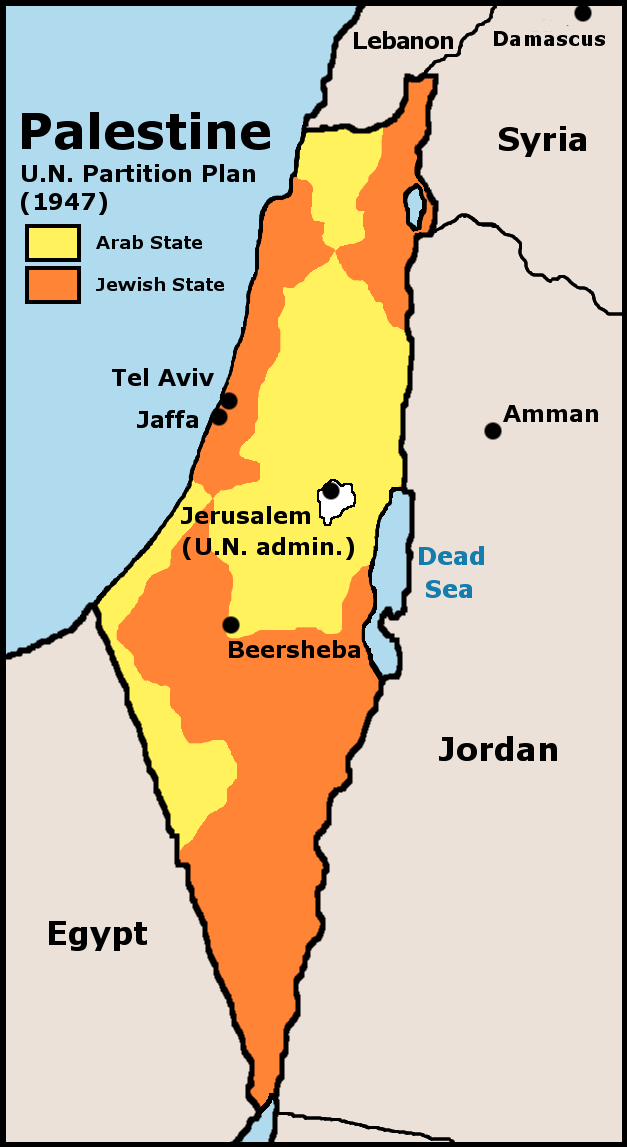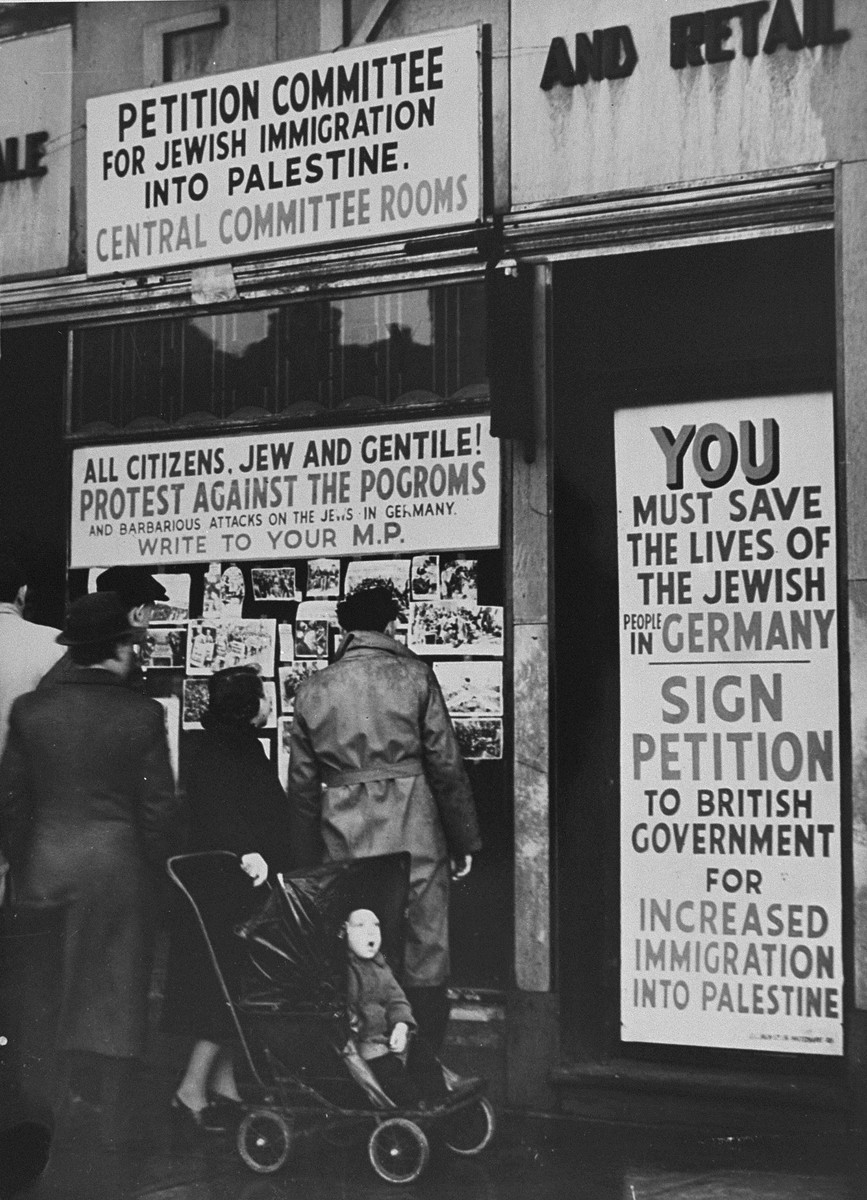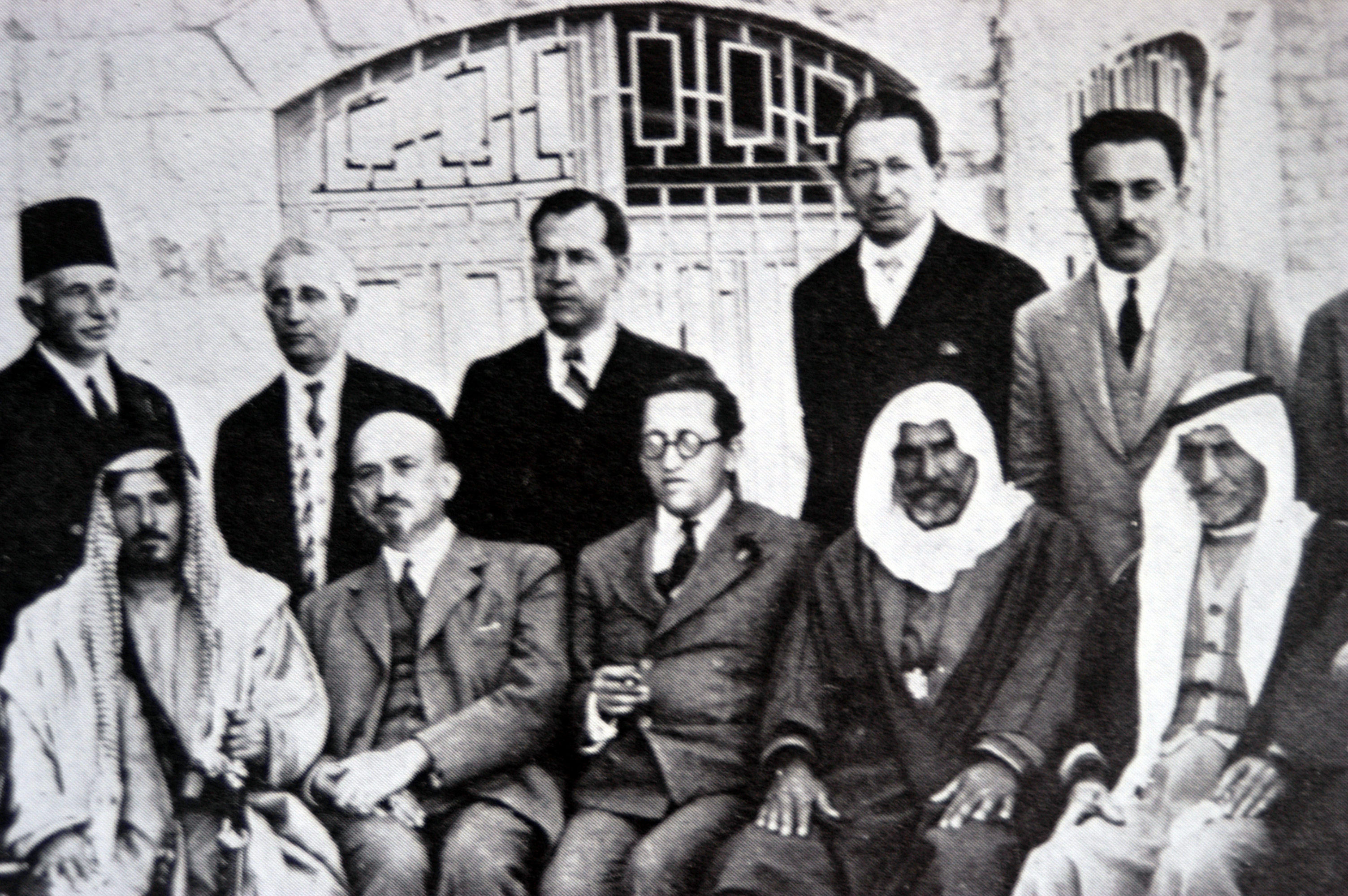|
Musa Al-Alami
Musa Alami (3 May 1897 – 8 June 1984) ( ar, موسى العلمي, ) was a prominent Palestinian nationalist and politician. Due to Alami having represented Palestine at various Arab conferences, in the 1940s, he was viewed by many as the leader of the Palestinian Arabs. Biography Early life and political career Alami was born in the Musrara neighborhood of Jerusalem, Palestine, into a prominent family. His father was Mayor of Jerusalem Faidi al-Alami, his sister was married to Jamal al-Hussayni, and he was the uncle of Serene Husseini Shahid. Alami was first taught at the school of the American Colony and at the French Ecole des Freres in Jaffa. During World War I, he worked at the censorship office in Damascus. Alami retained a positive view of the Ottoman empire, recalling that the Arabs regarded the Turks as partners rather than oppressors, and above all, that Palestine was largely ruled by Palestinian officials. Alami claimed that "a greater degree of freedom and ... [...More Info...] [...Related Items...] OR: [Wikipedia] [Google] [Baidu] |
Jerusalem
Jerusalem (; he, יְרוּשָׁלַיִם ; ar, القُدس ) (combining the Biblical and common usage Arabic names); grc, Ἱερουσαλήμ/Ἰεροσόλυμα, Hierousalḗm/Hierosóluma; hy, Երուսաղեմ, Erusałēm. is a city in Western Asia. Situated on a plateau in the Judaean Mountains between the Mediterranean Sea, Mediterranean and the Dead Sea, it is one of the List of oldest continuously inhabited cities, oldest cities in the world and is considered to be a holy city for the three major Abrahamic religions: Judaism, Christianity, and Islam. Both Israelis and Palestinians claim Jerusalem as their Capital city, capital, as Israel maintains its primary governmental institutions there and the State of Palestine ultimately foresees it as its seat of power. Because of this dispute, Status of Jerusalem, neither claim is widely recognized internationally. Throughout History of Jerusalem, its long history, Jerusalem has been destroyed at least twice, Sie ... [...More Info...] [...Related Items...] OR: [Wikipedia] [Google] [Baidu] |
Mandatory Palestine
Mandatory Palestine ( ar, فلسطين الانتدابية '; he, פָּלֶשְׂתִּינָה (א״י) ', where "E.Y." indicates ''’Eretz Yiśrā’ēl'', the Land of Israel) was a geopolitical entity established between 1920 and 1948 in the region of Palestine under the terms of the League of Nations Mandate for Palestine. During the First World War (1914–1918), an Arab uprising against Ottoman rule and the British Empire's Egyptian Expeditionary Force under General Edmund Allenby drove the Ottoman Turks out of the Levant during the Sinai and Palestine Campaign. The United Kingdom had agreed in the McMahon–Hussein Correspondence that it would honour Arab independence if the Arabs revolted against the Ottoman Turks, but the two sides had different interpretations of this agreement, and in the end, the United Kingdom and France divided the area under the Sykes–Picot Agreementan act of betrayal in the eyes of the Arabs. Further complicating the issue was t ... [...More Info...] [...Related Items...] OR: [Wikipedia] [Google] [Baidu] |
Galilee
Galilee (; he, הַגָּלִיל, hagGālīl; ar, الجليل, al-jalīl) is a region located in northern Israel and southern Lebanon. Galilee traditionally refers to the mountainous part, divided into Upper Galilee (, ; , ) and Lower Galilee (, ; , ). ''Galilee'' refers to all of the area that is north of the Mount Carmel-Mount Gilboa ridge and south of the east–west section of the Litani River. It extends from the Israeli coastal plain and the shores of the Mediterranean Sea with Acre in the west, to the Jordan Rift Valley to the east; and from the Litani in the north plus a piece bordering on the Golan Heights all the way to Dan at the base of Mount Hermon in the northeast, to Mount Carmel and Mount Gilboa in the south. This definition includes the plains of the Jezreel Valley north of Jenin and the Beth Shean Valley, the valley containing the Sea of Galilee, and the Hula Valley, although it usually does not include Haifa's immediate northern suburbs. By this definiti ... [...More Info...] [...Related Items...] OR: [Wikipedia] [Google] [Baidu] |
1948 Arab-Israeli War
Events January * January 1 ** The General Agreement on Tariffs and Trade (GATT) is inaugurated. ** The Constitution of New Jersey (later subject to amendment) goes into effect. ** The railways of Britain are nationalized, to form British Railways. * January 4 – Burma gains its independence from the United Kingdom, becoming an independent republic, named the ''Union of Burma'', with Sao Shwe Thaik as its first President, and U Nu its first Prime Minister. * January 5 ** Warner Brothers shows the first color newsreel (''Tournament of Roses Parade'' and the ''Rose Bowl Game''). ** The first Kinsey Reports, Kinsey Report, ''Sexual Behavior in the Human Male'', is published in the United States. * January 7 – Mantell UFO incident: Kentucky Air National Guard pilot Thomas Mantell crashes while in pursuit of an unidentified flying object. * January 12 – Mahatma Gandhi begins his fast-unto-death in Delhi, to stop communal violence during the Partition of India. * ... [...More Info...] [...Related Items...] OR: [Wikipedia] [Google] [Baidu] |
Declaration Of The Establishment Of The State Of Israel
The Israeli Declaration of Independence, formally the Declaration of the Establishment of the State of Israel ( he, הכרזה על הקמת מדינת ישראל), was proclaimed on 14 May 1948 ( 5 Iyar 5708) by David Ben-Gurion, the Executive Head of the World Zionist Organization, Chairman of the Jewish Agency for Palestine, and soon to be first Prime Minister of Israel. It declared the establishment of a Jewish state in Eretz-Israel, to be known as the State of Israel, which would come into effect on termination of the British Mandate at midnight that day. The event is celebrated annually in Israel with a national holiday Independence Day on 5 Iyar of every year according to the Hebrew calendar. Background The possibility of a Jewish homeland in Palestine had been a goal of Zionist organizations since the late 19th century. In 1917 British Foreign Secretary Arthur Balfour stated in a letter to British Jewish community leader Walter, Lord Rothschild that: His Majesty' ... [...More Info...] [...Related Items...] OR: [Wikipedia] [Google] [Baidu] |
White Paper Of 1939
The White Paper of 1939Occasionally also known as the MacDonald White Paper (e.g. Caplan, 2015, p.117) after Malcolm MacDonald, the British Colonial Secretary, who presided over its creation. was a policy paper issued by the British government, led by Neville Chamberlain, in response to the 1936–1939 Arab revolt in Palestine. After its formal approval in the House of Commons on 23 May 1939,by 268 votes to 179. it acted as the governing policy for Mandatory Palestine from 1939 to the 1948 British departure. After the war, the Mandate was referred to the United Nations. The policy, first drafted in March 1939, was prepared by the British government unilaterally as a result of the failure of the Arab-Zionist London Conference. The paper called for the establishment of a Jewish national home in an independent Palestinian state within 10 years, rejecting the Peel Commission's idea of partitioning Palestine. It also limited Jewish immigration to 75,000 for five years and ruled th ... [...More Info...] [...Related Items...] OR: [Wikipedia] [Google] [Baidu] |
London Conference (1939)
The London Conference (1939), or ''St James's Palace Conference'', which took place between 7 February-17 March 1939, was called by the British Government to plan the future governance of Palestine and an end of the Mandate. It opened on 7 February 1939 in St James's Palace after which the Colonial Secretary, Malcolm MacDonald held a series of separate meetings with an Arab and a Jewish delegation, because the Arab delegation refused to sit in the same room as the Jewish delegation. When MacDonald first announced the proposed conference he made clear that if no agreement was reached the government would impose a solution. The process came to an end after five and a half weeks with the British announcing proposals which were later published as the 1939 White Paper. Background In 1936, following the Great Arab Revolt, Arabs in Palestine went on a general strike. Additionally, Palestinian Arab leaders formed the Higher National Committee (HNC). After the strike, the British g ... [...More Info...] [...Related Items...] OR: [Wikipedia] [Google] [Baidu] |
Baghdad
Baghdad (; ar, بَغْدَاد , ) is the capital of Iraq and the second-largest city in the Arab world after Cairo. It is located on the Tigris near the ruins of the ancient city of Babylon and the Sassanid Persian capital of Ctesiphon. In 762 CE, Baghdad was chosen as the capital of the Abbasid Caliphate, and became its most notable major development project. Within a short time, the city evolved into a significant cultural, commercial, and intellectual center of the Muslim world. This, in addition to housing several key academic institutions, including the House of Wisdom, as well as a multiethnic and multi-religious environment, garnered it a worldwide reputation as the "Center of Learning". Baghdad was the largest city in the world for much of the Abbasid era during the Islamic Golden Age, peaking at a population of more than a million. The city was largely destroyed at the hands of the Mongol Empire in 1258, resulting in a decline that would linger through many c ... [...More Info...] [...Related Items...] OR: [Wikipedia] [Google] [Baidu] |
Beirut
Beirut, french: Beyrouth is the capital and largest city of Lebanon. , Greater Beirut has a population of 2.5 million, which makes it the third-largest city in the Levant region. The city is situated on a peninsula at the midpoint of Lebanon's Mediterranean coast. Beirut has been inhabited for more than 5,000 years, and was one of Phoenicia's most prominent city states, making it one of the oldest cities in the world (see Berytus). The first historical mention of Beirut is found in the Amarna letters from the New Kingdom of Egypt, which date to the 14th century BC. Beirut is Lebanon's seat of government and plays a central role in the Lebanese economy, with many banks and corporations based in the city. Beirut is an important seaport for the country and region, and rated a Beta + World City by the Globalization and World Cities Research Network. Beirut was severely damaged by the Lebanese Civil War, the 2006 Lebanon War, and the 2020 massive explosion in the ... [...More Info...] [...Related Items...] OR: [Wikipedia] [Google] [Baidu] |
Walter Laqueur
Walter Ze'ev Laqueur (26 May 1921 – 30 September 2018) was a German-born American historian, journalist and political commentator. He was an influential scholar on the subjects of terrorism and political violence. Biography Walter Laqueur was born in Breslau, Lower Silesia, Germany (today Wrocław, Poland), into a Jewish family. In November 1938 he left Germany, immigrating to the British Mandate of Palestine. His parents, who were unable to leave, were murdered in the Holocaust. After less than a year at the Hebrew University of Jerusalem, he left to work as an agricultural laborer and guard. In 1942 he became a member of kibbutz HaZore'a. Laqueur was married to Naomi Koch, with whom he had two daughters. His second wife was Christa Susi Genzen. Laqueur died at his home in Washington, D.C., on September 30, 2018. Journalism and academic career From 1944, when he moved to Jerusalem, until his departure in 1955 he worked as a journalist for the Hashomer Hatzair newspaper, ' ... [...More Info...] [...Related Items...] OR: [Wikipedia] [Google] [Baidu] |
Moshe Sharett
Moshe Sharett ( he, משה שרת, born Moshe Chertok (Hebrew: ) 15 October 1894 – 7 July 1965) was a Russian-born Israeli politician who served as Israel's second prime minister from 1954 to 1955. A member of Mapai, Sharett's term was both preceded and succeeded by the premiership of David Ben-Gurion. Sharett also served as the country's first foreign minister between 1948 and 1956. Biography Born in Kherson in the Russian Empire (today in Ukraine), Sharett immigrated to Ottoman Palestine as a child in 1906. For two years, 1906–1907, the family lived in a rented house in the village of Ein-Sinya, north of Ramallah. In 1910 his family moved to Jaffa, then became one of the founding families of Tel Aviv. He graduated from the first class of the Herzliya Hebrew High School, even studying music at the Shulamit Conservatory. He then went to Constantinople to study law at Istanbul University, the same university at which Yitzhak Ben-Zvi and David Ben-Gurion studied. Howeve ... [...More Info...] [...Related Items...] OR: [Wikipedia] [Google] [Baidu] |
David Ben-Gurion
David Ben-Gurion ( ; he, דָּוִד בֶּן-גּוּרִיּוֹן ; born David Grün; 16 October 1886 – 1 December 1973) was the primary national founder of the State of Israel and the first prime minister of Israel. Adopting the name of Ben-Gurion in 1909, he rose to become the preeminent leader of the Jewish community in British-ruled Mandatory Palestine from 1935 until the establishment of the State of Israel in 1948, which he led until 1963 with a short break in 1954–55. Ben-Gurion's passion for Zionism, which began early in life, led him to become a major Zionist leader and executive head of the World Zionist Organization in 1946. As head of the Jewish Agency from 1935, and later president of the Jewish Agency Executive, he was the ''de facto'' leader of the Jewish community in Palestine, and largely led its struggle for an independent Jewish state in Mandatory Palestine. On 14 May 1948, he formally proclaimed the establishment of the State of Israel, and was t ... [...More Info...] [...Related Items...] OR: [Wikipedia] [Google] [Baidu] |









_-_POALEI_ZION.jpg)